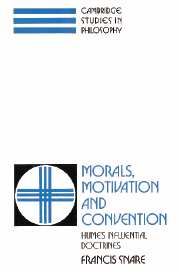Book contents
- Frontmatter
- Contents
- Acknowledgements
- NOTE
- Introduction
- Part I The argument for sentimentalism
- 1 A systematic ambiguity
- 2 The influence argument
- 3 Some bad reasons for believing the first premiss
- 4 The Humean theory of motivating reasons
- 5 The provocative Humean theory of motivation
- Part II The problems and consequences of sentimentalism
- Bibliography
- Index
1 - A systematic ambiguity
Published online by Cambridge University Press: 05 June 2012
- Frontmatter
- Contents
- Acknowledgements
- NOTE
- Introduction
- Part I The argument for sentimentalism
- 1 A systematic ambiguity
- 2 The influence argument
- 3 Some bad reasons for believing the first premiss
- 4 The Humean theory of motivating reasons
- 5 The provocative Humean theory of motivation
- Part II The problems and consequences of sentimentalism
- Bibliography
- Index
Summary
Certain of Hume's arguments at the beginning of Book III have remained influential, although often altered, in contemporary philosophy. The immediately following chapters will examine these arguments, one especially, in some detail. But the question of this chapter is a simple one: What is at issue in these arguments? That is, what is Hume's basic thesis in his discussion of ‘moral subjects’? Actually we are raising two questions at once. The slightly more boring question is the historical one: ‘What did Hume think he was showing in Part i of Book III?’ The more interesting question for contemporary Humeans is: ‘What do his best arguments there, or charitable reconstructions of them, actually succeed in showing?’ Of course the latter question bears on the former. Those with any respect for Hume's genius think that what his arguments actually do prove is some (if not conclusive) evidence as to what he thought he was proving. Among other things this chapter will briefly examine three kinds of evidence that bear on the former, the historical, question of what Hume himself thought he was proving:
i. How Hume describes the thesis for which he argues.
ii. The philosophical positions (e.g. of Clarke, Wollaston) which Hume opposes and which he means to rule out by his thesis.
and again:
iii. What the arguments he gives could plausibly be taken to prove.
HUME'S DESCRIPTION OF THE ISSUE
The place to begin is with Hume's own description of the conclusion he wished to prove.
- Type
- Chapter
- Information
- Morals, Motivation, and ConventionHume's Influential Doctrines, pp. 11 - 33Publisher: Cambridge University PressPrint publication year: 1991

